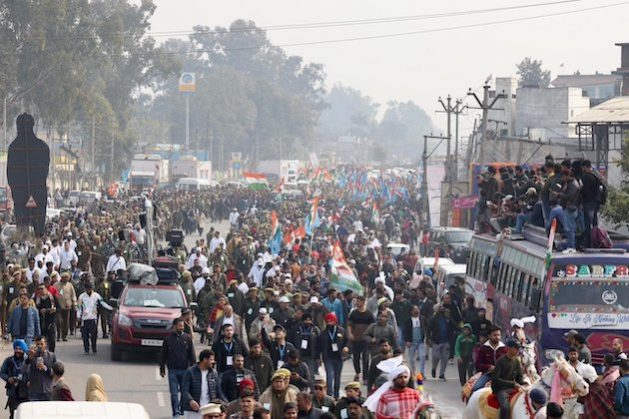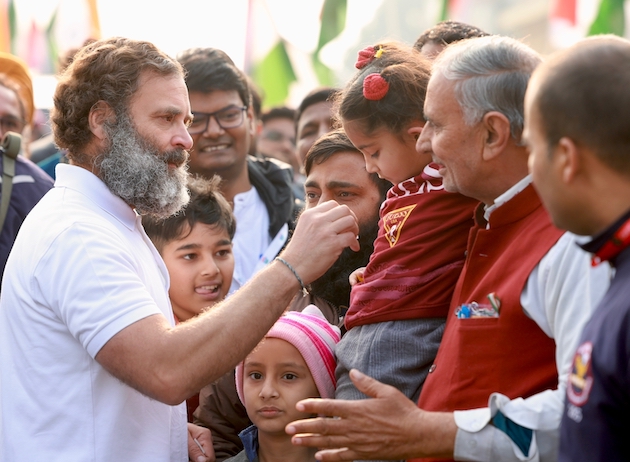Rahul Gandhis Long Walk Hailed, But Only Polls Will Determine Its Success

GOA, INDIA, Jan 26 (IPS) - When countless supporters of the Indian National Congress, the main opposition party, arrive in Srinagar on January 30 to hoist the Indian flag, they would have walked 3,570 kilometres over 150 days.
The Congress Party organised the Bharat Jodo Yatra (BJY), a long march to counter what it calls the divisive politics of the ruling party. The exercise was to revive the idea of India as a country united in all its diversity. The BJY is led by senior Congress leader Rahul Gandhi, 52, who met countless citizens on the way at a time when Prime Minister Narendra Modi has not held a single press conference in the last nine years that he has been in power.
Founder and editor of The Citizen Seema Mustafa told the IPS Rahul Gandhi gained by leading the BJY.
“He has emerged as a leader of substance with courage and honesty and compassion on display. What the Congress Party has gained will only be known once Congressmen can take it all forward. Other gains and losses will come after that, but for now, the BJY has indeed cut through the prevailing atmosphere of fear and hate,” said Mustafa.
The BJY will culminate in the Himalayan region of Kashmir on January 30 but will it receive the same kind of welcome as it has in the rest of the country, is the question. For nearly half a century, the people of Kashmir have complained of Delhi's stepmotherly attitude towards them.
Spymaster and former head of India’s Intelligence agency, the Research and Analysis Wing (RAW), AS Dulat, had a personal invitation to join the BJY. He walked for one hour with Rahul Gandhi, but Dulat did not say whether they talked about the troubled province of Kashmir.
Dulat’s latest book, A Life in the Shadows, is about Kashmir, a place he loves passionately. He was first posted to Kashmir in the late 1980s. As a former Prime Minister’s advisor on Kashmir, he understands the Kashmiri psyche and empathises with the problems in the province. Because he is seen as a problem solver and well-wisher of all the people suffering in Kashmir, including separatists, militants, and Pakistanis, he is called Mr Kashmir.
In the book, he implies that the problem of militancy is no longer about joining Pakistan or seeking independence but resistance to the harsh majoritarian policies of muscular power tactics used against the people of Kashmir by the present government in Delhi.

Dulat told the media that participating in the BJY was a wonderful experience. Gandhi wrote in a letter inviting Dulat to join the march, “We listen to anyone who wants to be heard. We offer no judgment or opinion. We walk to unite every Indian regardless of their gender, caste or religion because we know they are equal citizens. We walk to fight hatred and fear.”
Dulat commented: “I think what this young man is doing is certainly something exceptional… incredible.”’ He doesn’t think that anyone will ever do it again, and nobody is going to walk so many kilometres again.
However, his walk has had its critics – with the Defence Minister Rajnath Singh accusing Gandhi of tarnishing the image of India by creating the impression that only hatred prevails in the country.
The BJY was started last September on the southern tip of the Indian peninsula in Kanyakumari, and it has marched non-stop through 12 provinces. During the march, Gandhi spent time with scores of citizens from different walks of life. After walking about 25 kilometres daily in two shifts, the Congress workers slept in makeshift accommodations at night.
Talking to IPS, a professor at Delhi’s Jawaharlal Nehru University (JNU), Zoya Hasan, agreed that the march had succeeded.
“If crowds are any indicator, the BJY got an enthusiastic response in all the states it traversed. This shows that there is still space in the country for inclusive politics,” Hasan said.
Many see the march as altering the country’s mood. It has brought hope into the lives of citizens who have been feeling increasingly fearful of their future and security. Largely ignored by (mainly pro-government) mainstream media, the BJY has been streaming live on social media. Watching supporters walk thousands of miles and meet hundreds of thousands of people of all faiths mingling, embracing, shaking hands and making friends has reinforced positive ideas of bonhomie and togetherness amongst citizens.
Ever since the Bhartiya Janata Party (BJP) came to power in 2014, the mood in the nation has been grim. Apart from tackling the never-ending scourge of poverty, the country has had to deal with repeated incidents of public violence.
The BJP has been criticised for being communitarian, and commentators say this, at best, ignores and, at worst, encourages violence by citizens against each other and divides Indian society by religious affiliation.
Nobel Laureate Amartya Sen, in an interview, Sen had told Le Monde, the French daily newspaper, that the Indian government is one of the most appalling in the world because it is communitarian in the narrowest sense of the term. It harms India by attacking Muslims and propagating the idea that Hindus form the nation.
Many consider the BJY march a success as a political protest against the alleged divisive politics of the right-wing ruling party in power.
“I joined the march and walked with Rahul Gandhi not because I am a fan of the Congress Party but because I thought the young man (Rahul Gandhi) has stood up for the right values at the right time, and I support similar values,” filmmaker Saeed Mirza said at the launch of his latest book I Know The Psychology of Rats in Goa recently.
“I believe every Indian who wants love and inclusiveness should be participating in the yatra beyond political identity. Although it is a predominately Congress-organised event, it is not exclusively a Congress event. So every Indian has been welcomed with open arms, and that is how it should be. If political pettiness comes in the way, it will be a self-defeating attitude,” said Tushar Gandhi, who joined the march last November. Tushar is Mahatma Gandhi's great-grandson, and Rahul Gandhi is the great-grandson of Jawaharlal Nehru, the first Prime Minister of India.
The Congress Party says the objective of the BJY is to fight against the politics of fear, bigotry and prejudice and the economics of livelihood destruction, increasing unemployment and growing inequalities.
“What the yatra has achieved is way beyond what the sceptics anticipated. They have been proved wrong, and I include myself in the category. A suffocated nation was waiting for some such happening,” wrote journalist Saeed Naqvi.
Hasan adds that the BJY has refurbished the Congress’s credentials as a party of national unity and social cohesion, upholding the values of secularism, the welfare of the masses and their constitutionally granted rights. This marks an important wedge in a hyper-nationalist narrative of the ruling party's politics.
Hasan said the impact of the BJY was that the ruling party wasn’t setting the narrative but was forced to react to the Congress Party. While only time will tell whether the march will bring electoral gains to the Congress Party in the general elections to be held in 2024, Hasan says:
“It is the necessary first step in building a politics of change.”
IPS UN Bureau Report
Follow @IPSNewsUNBureau
Follow IPS News UN Bureau on Instagram
© Inter Press Service (2023) — All Rights Reserved. Original source: Inter Press Service
 Global Issues
Global Issues